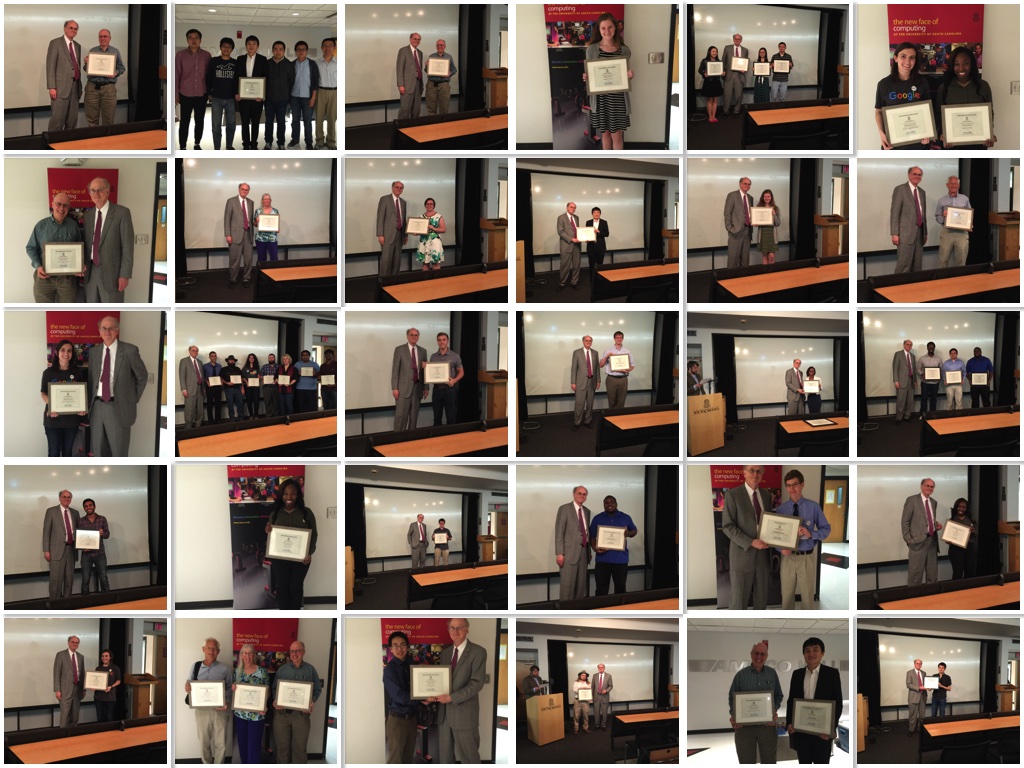Checkout our website for prospective students.
Discovery Day Award Winners
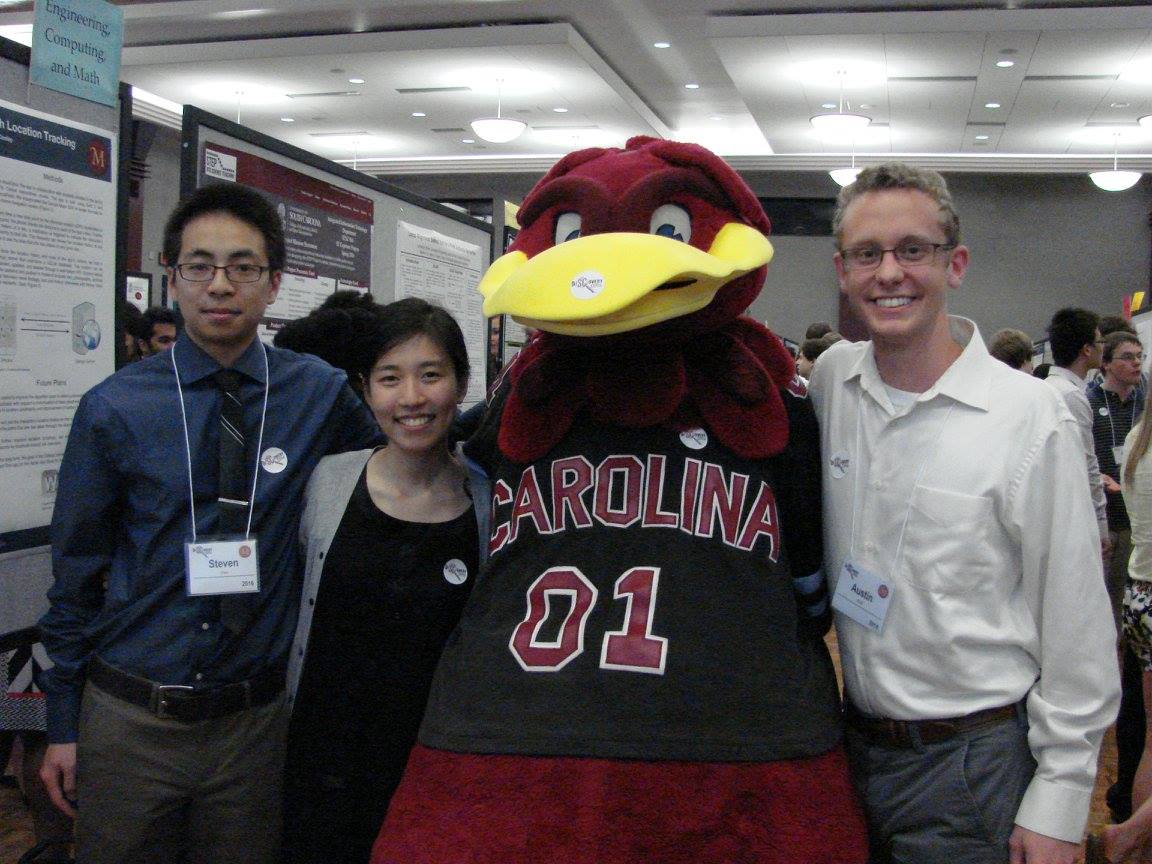
 We would like to congratulate our Discovery Day winners. Omar Ansari won a first place award for his poster "The use of remote telepresence in collegiate classrooms to facilitate eLearning". Steven Dao and Austin Pahl won a first place award for "Enhancing Interactor Experience in the Ward One App". Nicholas Weidner won second place for "Underwater Cave Mapping using Stereo Vision". Blakeley Hoffman won second place for "Cooperative Set Function Without Communication". Theodore Stone and Nathaniel Stone won an honarable mention for "Correlating a Smart Soccer Ball’s Impact Acceleration to Impact Force". Adel Alamri won an honarable mention for "Speech Signs - Signing with Children."
Full List of winners.
We would like to congratulate our Discovery Day winners. Omar Ansari won a first place award for his poster "The use of remote telepresence in collegiate classrooms to facilitate eLearning". Steven Dao and Austin Pahl won a first place award for "Enhancing Interactor Experience in the Ward One App". Nicholas Weidner won second place for "Underwater Cave Mapping using Stereo Vision". Blakeley Hoffman won second place for "Cooperative Set Function Without Communication". Theodore Stone and Nathaniel Stone won an honarable mention for "Correlating a Smart Soccer Ball’s Impact Acceleration to Impact Force". Adel Alamri won an honarable mention for "Speech Signs - Signing with Children."
Full List of winners.Dr. Terejanu Receives Research Award
 Dr. Gabriel Terejanu, along with Dr. Sourav Banerjee (Mechanical Engineering), Dr. Anindya Chanda and Dr. Robin Kloot (Environmental Health Sciences), has received an award from the Natural Resources Conservation Service (NRCS)/USDA for a data collection project with the title "Using Cover Crops and Soil Health to Reduce Crop Stress and Aflatoxin Contamination". As part of this project the researchers will deploy a sensor network to collect environmental data from a cornfield in collaboration with a local farmer. The data will be used to develop and demonstrate a predictive framework for calculating aflatoxin occurrence in South Carolina cornfields prior to harvest. Aflatoxin is a carcinogenic toxin naturally produced by Aspergillus family of fungi (flavus, parasiticus) occurring in soil and decaying vegetation, which can contaminate corn along with other relevant South Carolina crops like peanuts and cotton before harvest and/or during storage. It is well know that aflatoxin exposure causes one of the deadliest cancers worldwide, namely liver cancer in humans and a variety of animal species. Prediction and control of aflatoxin contaminations before harvest are a fundamental challenge for US grain industry, poultry producers, and makers of dairy products. The predictive model will be used to continuously monitor the aflatoxin incidence in cornfields and provide the farmers with actionable information regarding the best time to harvest and efficient isolation of contaminated areas, as well as testing the role of cover crops and irrigation in plant stress regulation and aflatoxin contamination.
Dr. Gabriel Terejanu, along with Dr. Sourav Banerjee (Mechanical Engineering), Dr. Anindya Chanda and Dr. Robin Kloot (Environmental Health Sciences), has received an award from the Natural Resources Conservation Service (NRCS)/USDA for a data collection project with the title "Using Cover Crops and Soil Health to Reduce Crop Stress and Aflatoxin Contamination". As part of this project the researchers will deploy a sensor network to collect environmental data from a cornfield in collaboration with a local farmer. The data will be used to develop and demonstrate a predictive framework for calculating aflatoxin occurrence in South Carolina cornfields prior to harvest. Aflatoxin is a carcinogenic toxin naturally produced by Aspergillus family of fungi (flavus, parasiticus) occurring in soil and decaying vegetation, which can contaminate corn along with other relevant South Carolina crops like peanuts and cotton before harvest and/or during storage. It is well know that aflatoxin exposure causes one of the deadliest cancers worldwide, namely liver cancer in humans and a variety of animal species. Prediction and control of aflatoxin contaminations before harvest are a fundamental challenge for US grain industry, poultry producers, and makers of dairy products. The predictive model will be used to continuously monitor the aflatoxin incidence in cornfields and provide the farmers with actionable information regarding the best time to harvest and efficient isolation of contaminated areas, as well as testing the role of cover crops and irrigation in plant stress regulation and aflatoxin contamination.Lin Wins National Award for Outstanding Chinese Student
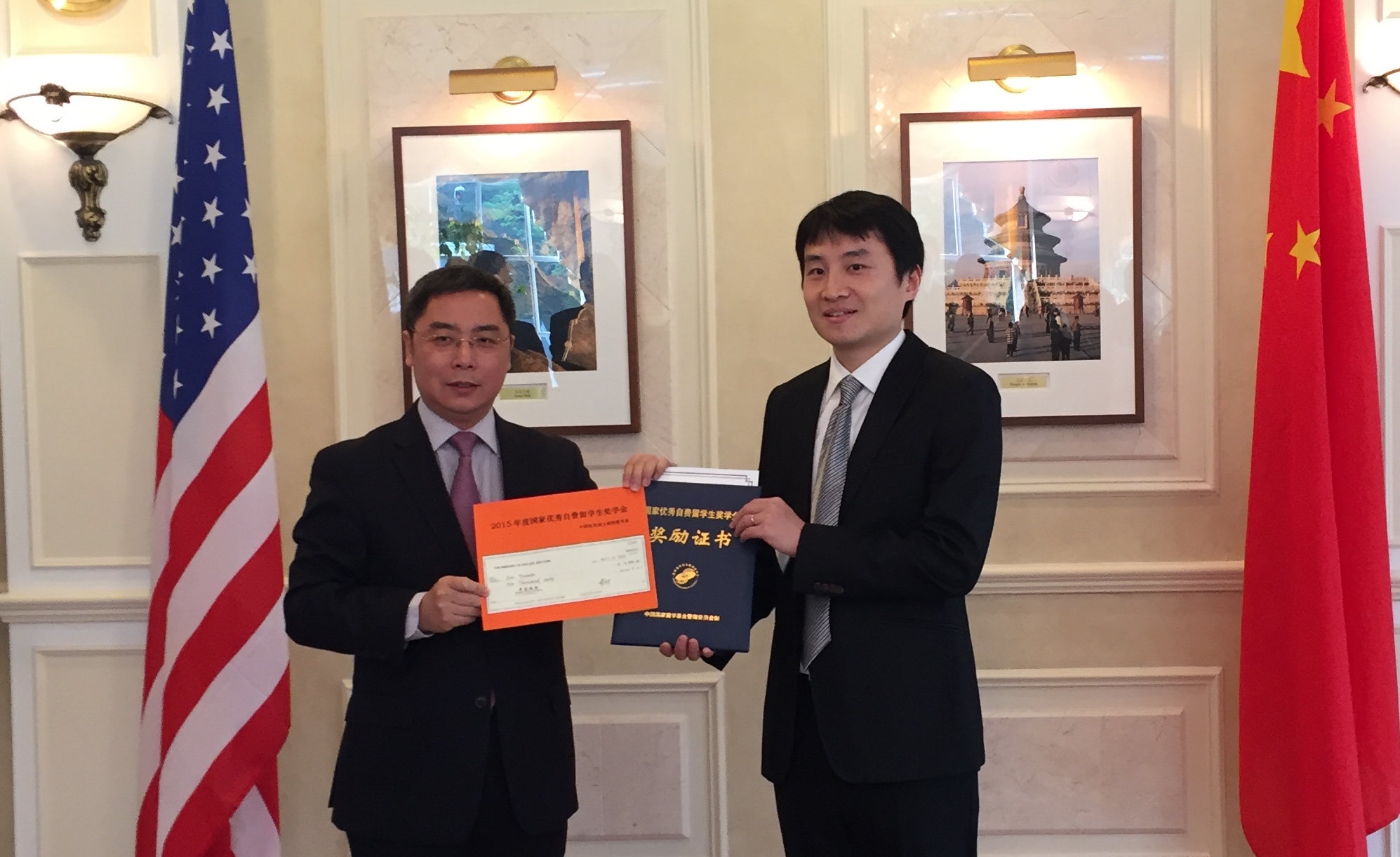 We are happy to announce that Yuewei Lin, one of our graduating Ph.D. students and also this year’s department Outstanding Graduate Researcher, just received a 2015 "National Award for Outstanding Self-financed Chinese Students Studying Abroad" by China Scholarship Council. The cash prize amount is $6,000. This award was founded by the Chinese government with the purpose of rewarding the academic excellence of self-financed Chinese students studying overseas, encouraging them to return or serve the motherland in various forms, showing the government's care to self-financed Chinese students.
We are happy to announce that Yuewei Lin, one of our graduating Ph.D. students and also this year’s department Outstanding Graduate Researcher, just received a 2015 "National Award for Outstanding Self-financed Chinese Students Studying Abroad" by China Scholarship Council. The cash prize amount is $6,000. This award was founded by the Chinese government with the purpose of rewarding the academic excellence of self-financed Chinese students studying overseas, encouraging them to return or serve the motherland in various forms, showing the government's care to self-financed Chinese students.Bottorff Wins Caroliniana Leadership Award
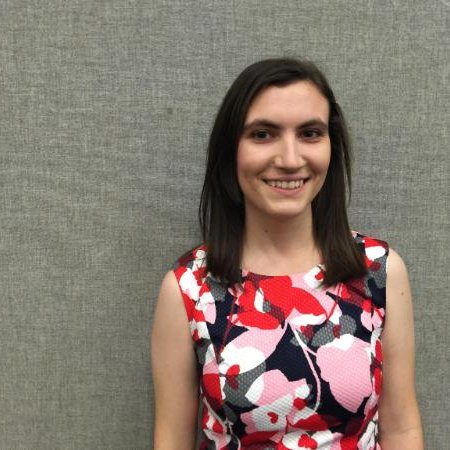 We are happy to announce that Maribeth Bottorff has received the Caroliniana Leadership Award. This award recognizes senior undergraduate students who have been the tireless, behind the scene workers that every successful activity or organization needs. They are leaders through their actions and contributions to the Carolina community. Maribeth is a Computer Science major with a minor in Chemistry and has made significant contributions to the Women in Computing Group, the CSE Student Advisory Council, and the Grace Hopper Conference trip. She will receive her Bachelor's degree this semester and has accepted a job at Google.
Bio:
Maribeth is a Computer Science major with a minor in Chemistry and is truly an outstanding student. She has been very active representing the university and mentoring younger female students. She was a founding member of the Women in Computing Group where she served as Vice President and then Co-President. She was instrumental in forming the CSE Student Advisory Council and having a suggestion box added to our website. She has made many suggestions for improving the educational experience for our students.
She led a group of 17 students to the Grace Hopper Conference, celebrating the contributions of women to the computing field. Attendees were inspired by hearing from female CIOs and other leaders in the field. Top companies like Apple, Google, and Microsoft were there to meet and interview attendees. With her outstanding credentials, Maribeth recently landed a job at Google.
Her “Ward One” project for her Critical Interactives course is an IPhone app that makes history come to life for the current residents of Ward One. By combining stories from previous residents, current and historical views of the area, it hopes to engender empathy, compassion, and critical discussions about the role urban renewal has played in our city’s history. She presented this to the residents of Ward One, at the SEC Academic Conference, and at the Carolina Women in Computing Conference. She will be presenting at Discovery Day in April and graduating with Leadership Distinction. Her leadership will be sorely missed by me personally and the department in general. She has been truly outstanding, a once in a decade student.
She will receive her Bachelor's degree this semester and has accepted a job at Google.
We are happy to announce that Maribeth Bottorff has received the Caroliniana Leadership Award. This award recognizes senior undergraduate students who have been the tireless, behind the scene workers that every successful activity or organization needs. They are leaders through their actions and contributions to the Carolina community. Maribeth is a Computer Science major with a minor in Chemistry and has made significant contributions to the Women in Computing Group, the CSE Student Advisory Council, and the Grace Hopper Conference trip. She will receive her Bachelor's degree this semester and has accepted a job at Google.
Bio:
Maribeth is a Computer Science major with a minor in Chemistry and is truly an outstanding student. She has been very active representing the university and mentoring younger female students. She was a founding member of the Women in Computing Group where she served as Vice President and then Co-President. She was instrumental in forming the CSE Student Advisory Council and having a suggestion box added to our website. She has made many suggestions for improving the educational experience for our students.
She led a group of 17 students to the Grace Hopper Conference, celebrating the contributions of women to the computing field. Attendees were inspired by hearing from female CIOs and other leaders in the field. Top companies like Apple, Google, and Microsoft were there to meet and interview attendees. With her outstanding credentials, Maribeth recently landed a job at Google.
Her “Ward One” project for her Critical Interactives course is an IPhone app that makes history come to life for the current residents of Ward One. By combining stories from previous residents, current and historical views of the area, it hopes to engender empathy, compassion, and critical discussions about the role urban renewal has played in our city’s history. She presented this to the residents of Ward One, at the SEC Academic Conference, and at the Carolina Women in Computing Conference. She will be presenting at Discovery Day in April and graduating with Leadership Distinction. Her leadership will be sorely missed by me personally and the department in general. She has been truly outstanding, a once in a decade student.
She will receive her Bachelor's degree this semester and has accepted a job at Google.Cyber Defense Team Places Second
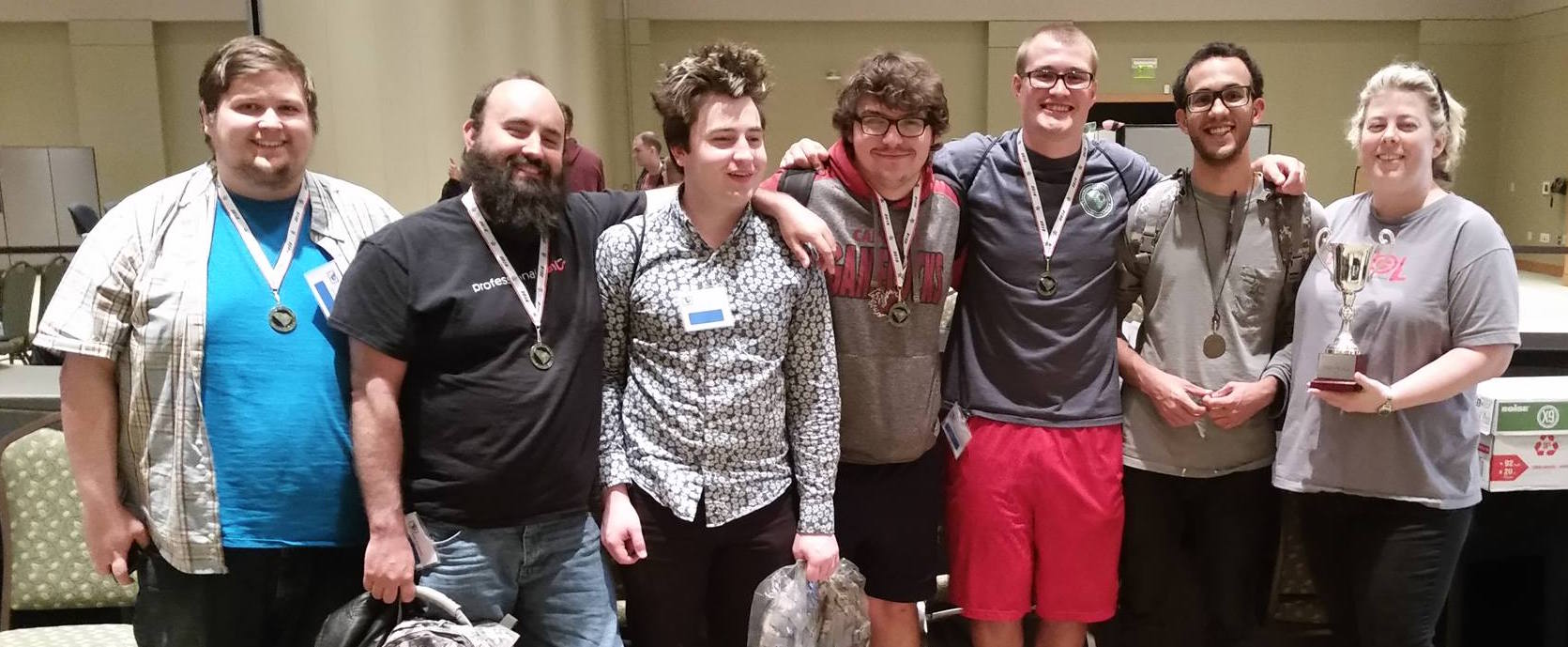 The USC Cyber Defense Team placed second at the 2016 Palmetto Cyber Defense Competition in Charleston on April 10, 2016. This annual competition between eight SC colleges and universities is designed to challenge the students to keep a virtual network of computers and devices secure while a "red team" of computer attackers is trying to compromise them. In this year's scenario, the students were tasked with defending a medical supply company's digital assets while maintaining business operations (delivering medical supplies to four virtual hospitals by deploying a fleet of supply trucks through an online interface.) They also had to perform digital investigations of malicious files using forensic techniques.
This competition tests six students' abilities to communicate and work as a team, as well as their technical skills and abilities to adapt and learn new technologies on the fly. "It's like juggling biting geese, while balancing on a beach ball rolling down a steep 2-inch wide ramp - as a team. And you've juggled before, but never with biting geese, so you have to learn that technique as you go," says mentor Ronni Wilkinson. One rock star team member, Dylan Madisetti, rewrote the truck management application so that it automatically deployed the supply trucks where they were needed without human intervention. He put his automated application on a computer that the red team was not attacking, so that when the rest of the network went down, the virtual hospitals were still getting their supplies.
Students really appreciate competitions like this because they test the skills that they are going to be using later in the workplace when they graduate. Clemson University came in first place, while the Citadel took third.
The USC Cyber Defense Team placed second at the 2016 Palmetto Cyber Defense Competition in Charleston on April 10, 2016. This annual competition between eight SC colleges and universities is designed to challenge the students to keep a virtual network of computers and devices secure while a "red team" of computer attackers is trying to compromise them. In this year's scenario, the students were tasked with defending a medical supply company's digital assets while maintaining business operations (delivering medical supplies to four virtual hospitals by deploying a fleet of supply trucks through an online interface.) They also had to perform digital investigations of malicious files using forensic techniques.
This competition tests six students' abilities to communicate and work as a team, as well as their technical skills and abilities to adapt and learn new technologies on the fly. "It's like juggling biting geese, while balancing on a beach ball rolling down a steep 2-inch wide ramp - as a team. And you've juggled before, but never with biting geese, so you have to learn that technique as you go," says mentor Ronni Wilkinson. One rock star team member, Dylan Madisetti, rewrote the truck management application so that it automatically deployed the supply trucks where they were needed without human intervention. He put his automated application on a computer that the red team was not attacking, so that when the rest of the network went down, the virtual hospitals were still getting their supplies.
Students really appreciate competitions like this because they test the skills that they are going to be using later in the workplace when they graduate. Clemson University came in first place, while the Citadel took third.Outstanding Student Awards
We are proud to announce the winners of the Outstanding student awards for this year. The undergraduate winners are:
- Theodore Stone, Computer Engineering Outstanding Senior,
- Michael Brunson, Computer Engineering SCSPE Award,
- Myndert Papenhuyzen, Computer Science Outstanding Senior,
- Jared Piedt, Computer Information Systems Outstanding Senior.
- Yuewei Lin, Outstanding Graduate Researcher,
- Nick Stiffler, Outstanding Graduate Instructor.
Embedded Systems Textbook
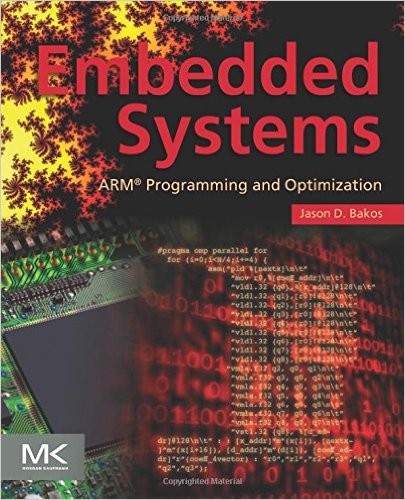 Dr. Jason Bakos is the author of a new textbook titled "Embedded Systems: ARM Programming and Optimization".
Dr. Jason Bakos is the author of a new textbook titled "Embedded Systems: ARM Programming and Optimization".This textbook combines an exploration of the ARM architecture with an examination of the facilities offered by the Linux operating system to explain how various features of program design can influence processor performance. It demonstrates methods by which a programmer can make changes to code without changing program semantics, but have a significant impact on code performance.
From the Back Cover
The modern consumer electronics industry as we know it owes much of its success and popularity to two technologies: the ARM processor and the Linux operating system. ARM processor technology powers nearly all modern mobile devices—and most of these processors run the Linux operating system. It’s no exaggeration to say that having an understanding of embedded system design and development from the context of ARM and Linux technology is an important asset in today’s world. This textbook combines an exploration of the ARM architecture with an examination of the facilities offered by the Linux operating system to explain how various features of program design can influence processor performance. It demonstrates methods by which a programmer can make changes to code without changing program semantics, but have a significant impact on code performance. Several applications, including image transformations, fractal generation, image convolution, and computer vision tasks, are used to describe and demonstrate these methods. From this, the reader will gain insight into computer architecture and application design, as well as gain practical knowledge in the area of embedded software design for modern embedded systems.About the Author
Jason D. Bakos is an associate professor of Computer Science and Engineering at the University of South Carolina. He received a BS in Computer Science from Youngstown State University in 1999 and a PhD in Computer Science from the University of Pittsburgh in 2005. Dr. Bakos’s research focuses on mapping data- and compute-intensive codes to high-performance, heterogeneous, reconfigurable, and embedded computer systems. His group works closely with FPGA-based computer manufacturers Convey Computer Corporation, GiDEL, and Annapolis Micro Systems, as well as GPU and DSP manufacturers NVIDIA, Texas Instruments, and Advantech. Dr. Bakos holds two patents, has published over 30 refereed publications in computer architecture and high performance computing, was a winner of the ACM/DAC student design contest in 2002 and 2004, and received the US National Science Foundation (NSF) CAREER award in 2009. He is currently serving as associate editor for ACM Transactions on Reconfigurable Technology and Systems.Dr. Tong Receives ONR Research Award
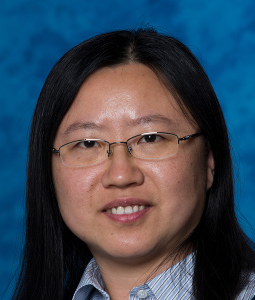 Dr. Yan Tong, along with Dr. Chen Li from the Mechanical Engineering department, has received a research award from the Office of Naval Research (ONR) for a research project on "Bubble Dynamics in a Confined Domain."
As part of this project they will develop a fully automatic vision-based technique for detecting L-Vinterfaces.
Abstract:
As one of the most promising solutions to cool high power devices owing to its potentials of high heat transfer rate with a low pumping power, flow boiling has been extensively studied in the last decade. Bubble dynamics is the key to understand fundamentals of boiling heat transfer. Studies have been performed to understand transport phenomenon including evaporation during bubble nucleation and growth phase as well as condensation on bubble surface in stagnant subcooled liquid. However, bubble or vapor slug dynamics during flow boiling in microchannels after departure has not been studied. In addition, criteria of vapor bubble collapse has not been Bubble/vapor slug dynamics is governed by two important phenomena: (1) evaporation during bubble nucleation and growth phase and (2) bubble condensation in subcooled liquid. Bubble or vapor slug dynamics in a confined domain is significantly different from that in an ordinary domain due to the restriction by the channel wall. We hypothesize that bubble collapse-coalesce after departure and the physics resulting in bubble growth, shrink, collapse, and merge should be equally important to the bubble nucleation and departure, if not more important, in determining two-phase flow pattern and transport performances.
In this project, we seek to conduct systematic studies to understand the bubble/vapor slug dynamics in a confined subcooled flow boiling condition in order to better understand flow boiling in mini/microchannels or gaps. Specifically, we will experimentally and numerically study bubble departure diameter and frequency, onset of nucleate boiling, criteria of bubble collapse, and particularly, average and local liquid-vapor (L-V) interfacial heat transfer coefficient under various flow and heat transfer conditions. Accurate measurements of fluid temperature are extremely challenging, but critical to quantify important governing parameters of bubble dynamics. Two approaches will be explored and evaluated to measure average and local fluid temperature distribution. These two approaches are (1) to directly measure fluid temperature using suspended micro resistors and (2) to directly measure local fluid temperature using a nanosensor array. The nanosensors are made from encapsulated RhB fluorophores. A fully automatic vision-based technique will be developed to detect L-V interfaces and to estimate the motion of the interface by non-rigid image registration and onsite-calibration. This vision-based technique is essential to reduce massive data from high-speed optical images to assure a consistent data reduction process.
The knowledge obtained through this project will greatly extend knowledge of two-phase transport at the microscale and would be critically important in further advancing a number of emerging technologies, such as micro-heat exchangers, microfluidic thrusters, microbubble-driven pumps, and microfluidic logics. More importantly, the success of this fundamental research will advance theoretical base in realizing promising two-phase cooling technologies. This will accelerate the development of highly efficient two-phase cooling technologies to manage waste heat for DoN high power sensors and weapon systems and therefore to enable superior defensive/offensive capabilities of the next generation warships.
Dr. Yan Tong, along with Dr. Chen Li from the Mechanical Engineering department, has received a research award from the Office of Naval Research (ONR) for a research project on "Bubble Dynamics in a Confined Domain."
As part of this project they will develop a fully automatic vision-based technique for detecting L-Vinterfaces.
Abstract:
As one of the most promising solutions to cool high power devices owing to its potentials of high heat transfer rate with a low pumping power, flow boiling has been extensively studied in the last decade. Bubble dynamics is the key to understand fundamentals of boiling heat transfer. Studies have been performed to understand transport phenomenon including evaporation during bubble nucleation and growth phase as well as condensation on bubble surface in stagnant subcooled liquid. However, bubble or vapor slug dynamics during flow boiling in microchannels after departure has not been studied. In addition, criteria of vapor bubble collapse has not been Bubble/vapor slug dynamics is governed by two important phenomena: (1) evaporation during bubble nucleation and growth phase and (2) bubble condensation in subcooled liquid. Bubble or vapor slug dynamics in a confined domain is significantly different from that in an ordinary domain due to the restriction by the channel wall. We hypothesize that bubble collapse-coalesce after departure and the physics resulting in bubble growth, shrink, collapse, and merge should be equally important to the bubble nucleation and departure, if not more important, in determining two-phase flow pattern and transport performances.
In this project, we seek to conduct systematic studies to understand the bubble/vapor slug dynamics in a confined subcooled flow boiling condition in order to better understand flow boiling in mini/microchannels or gaps. Specifically, we will experimentally and numerically study bubble departure diameter and frequency, onset of nucleate boiling, criteria of bubble collapse, and particularly, average and local liquid-vapor (L-V) interfacial heat transfer coefficient under various flow and heat transfer conditions. Accurate measurements of fluid temperature are extremely challenging, but critical to quantify important governing parameters of bubble dynamics. Two approaches will be explored and evaluated to measure average and local fluid temperature distribution. These two approaches are (1) to directly measure fluid temperature using suspended micro resistors and (2) to directly measure local fluid temperature using a nanosensor array. The nanosensors are made from encapsulated RhB fluorophores. A fully automatic vision-based technique will be developed to detect L-V interfaces and to estimate the motion of the interface by non-rigid image registration and onsite-calibration. This vision-based technique is essential to reduce massive data from high-speed optical images to assure a consistent data reduction process.
The knowledge obtained through this project will greatly extend knowledge of two-phase transport at the microscale and would be critically important in further advancing a number of emerging technologies, such as micro-heat exchangers, microfluidic thrusters, microbubble-driven pumps, and microfluidic logics. More importantly, the success of this fundamental research will advance theoretical base in realizing promising two-phase cooling technologies. This will accelerate the development of highly efficient two-phase cooling technologies to manage waste heat for DoN high power sensors and weapon systems and therefore to enable superior defensive/offensive capabilities of the next generation warships.Dr. Fenner's Lecture at the Institute for Advanced Studies
The video above is Dr. Fenner's invited talk at the Institute for Advanced Studies.
Dr. Rekleitis Receives Google Research Award
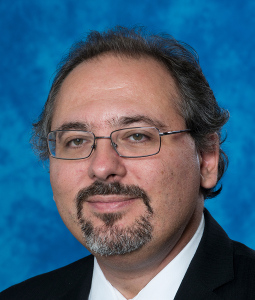 Dr. Ioannis Rekleitis has received a Google Research Award for his research on "Underwater Street View: Wreck Mapping off the Carolinas." The official announcement from Google states that they
Dr. Ioannis Rekleitis has received a Google Research Award for his research on "Underwater Street View: Wreck Mapping off the Carolinas." The official announcement from Google states that they received 950 proposals, an increase of 18% over last round, covering 55 countries and over 350 universities. After expert reviews and committee discussions, we decided to fund 151 projects.
SCCyber: UofSC Heads Initiative to Enhance Cyber Security
The CSE department's cybersecurity research and NSA designations as a National Academic Center of Excellence are critical pillars of the initiative. If you are interested, see our Information Assurance Specialization and Certificate of Graduate Study in Information Assurance and Security.
Below is a copy of the announcement from USC News.
From personal conveniences like online banking, electronic health records, and self-driving cars to national infrastructure like power grids and air traffic control, sensitive technology shapes our world. At the same time, new technologies are vulnerable to criminal exploitation and malicious or unintended usage. To prepare South Carolina to meet these challenges, the University of South Carolina, along with a consortium of leading industry, academic, and government partners, announces the creation of SC Cyber. SC Cyber is a statewide initiative, housed at the university and committed to securing our state’s critical infrastructure and to training those on the front lines of the fight to protect technological assets. The formation of SC Cyber was announced Wednesday (Feb. 24) by South Carolina Gov. Nikki R. Haley and UofSC President Harris Pastides. Building on the outreach efforts of USC’s Office of Economic Engagement, initial partners include the state Department of Commerce, the S.C. National Guard, academic institutions like Clemson University, and industry partners like IBM. "Carolina is proud to serve as the epicenter of this important work. We look forward to working with all our the consortium members in leveraging and expanding access to new technologies, research and education,” Pastides said. In South Carolina alone, there are an estimated 2,300 open cybersecurity positions and the field has grown more than 130 percent since 2010. SC Cyber will prepare students for high-paying cybersecurity-related jobs in the Palmetto State, as well as provide ongoing training and workforce development for practitioners already in the field. Initial course offerings will begin in the summer of 2016. “As hackers grow increasingly sophisticated, the need for skilled cybersecurity professionals is growing faster than ever – and the good guys must join forces in order to keep pace,” said Shelley Westman, vice president of Operations & Strategic Integration Initiatives for IBM Security. “IBM is committed to fostering collaboration between educators, public and private sector. To that extent, we are happy to partner with programs like SC Cyber to help develop the cybersecurity workforce of the future. By sharing data, tools and expertise amongst peers and students, we can better prepare the industry to defend against this new breed of advanced threats.” S.C. Secretary of Commerce Bobby Hitt agrees. “In South Carolina, our businesses are contemporary and dynamic, embracing the latest in technology and leading the way in innovation. With these advances, the continued development of our cyber security footprint is critical. More than just an economic driver, the expansion of this crucial industry sector will help ensure that our firms are utilizing the latest in IT protection, keeping South Carolina businesses and its employees secure,” Hitt said. SC Cyber also will develop educational content that can be disseminated to partner institutions and interested parties nationwide. By sharing the latest knowledge and techniques in threat detection, mitigation, response, and prevention, SC Cyber will help governments and businesses large and small to develop proactive strategies to assess and thwart cyberattacks, said Lester Eisner with USC’s Office of Economic Engagement. “SC Cyber is an opportunity to build a cyber ecosystem that leverages the best of industry, academia, and government,” Eisner said. “By utilizing 21st century technologies, tools, and talents, we can improve the security and prosperity of our state and our region.” Beyond training and education, SC Cyber will serve as a hub for research and development of new cybersecurity-related technologies through UofSC’s status as an NSA Center of Academic Excellence in Information Assurance Education and Research as well as the talents and expertise of SC Cyber’s industry and academic partners. By Jeff Stensland, stenslan@mailbox.sc.edu, 803-777-3686Also see Columbia Business Report article.
Student SPARC Winners
We congratulate two of our students for winning 2015-16 SPARC graduate research grants. They are Karina Liles for her project "Meeting students educational needs by engaging students in multiplication practice with a social robot" and Xiao Lin for the project "Computational Tool for identifying branching type of hyphal growth models". You can view the full list of winners.
Dr. Beer Receives NIH Research Award for Online Training Intervention
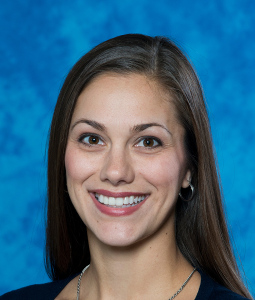 Dr. Jenay Beer has received a research award for her project titled "Usability of Self-Directed Online Training Intervention for Chinese Dementia Caregivers" from the Environment and Health Group/NIH. You can find her research papers in the Assistive Robotics and Technology Lab (ART Lab) website.
Dr. Jenay Beer has received a research award for her project titled "Usability of Self-Directed Online Training Intervention for Chinese Dementia Caregivers" from the Environment and Health Group/NIH. You can find her research papers in the Assistive Robotics and Technology Lab (ART Lab) website.